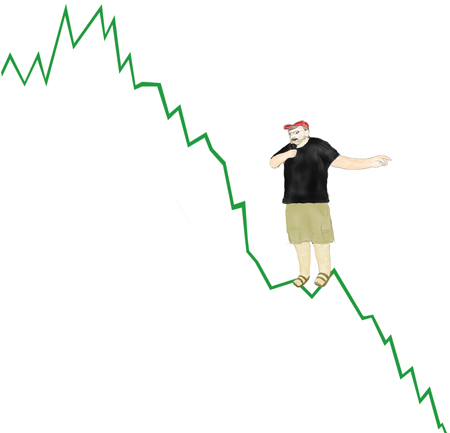The heads of most big American companies would rather not talk to Michael Moore, now, especially the CEOs of the major banks.
In his new film “Capitalism: A Love Story,” Moore explores the current state of the nation’s economy, focusing on housing foreclosures and unemployment.
By the end of the film, the audience is asked to take action in various ways against an economic system that favors the rich and allows the rest to suffer. In releasing this film, Moore is challenging Americans, especially young Americans, to make an effort in dividing government from business.
Sitting in a packed Bruin Theatre in Westwood, I watched as Moore walked down the aisle to introduce the movie.
Wearing his usual baseball cap, he spoke with ease, humor and passion. After the film, he returned to the front of the theatre for a Q&A session, and expressed his desire to inspire younger generations to fix the corrupt principles that run the American economic system by screening the film in a university theatre.
The film blames the downturn on the government’s deregulation of the banking industry and the loss of the principles of capitalism. If the United States truly ran a capitalist economy, according to the film, there would not be bailouts.
Capitalism is sink or swim ““ if a company isn’t successful, it goes under while happy customers reward better businesses and keep them afloat. Up until the Reagan years, as the film says, that was how American businesses were run.
The incentive structure is now based on greed rather than honest competition. Major corporations such as Wal-Mart were shown taking out life insurance policies on their workers who are oftentimes more valuable to the company dead than alive. The worker is called a “dead peasant” and their families are often completely unaware of the insurance money the company receives.
Aside from the story and facts revealed in the film, it challenges the audience to understand the morals underlying the principles of capitalism. How can the government justify taking away farm land families have owned for generations?
After being accused of stating false information, Moore focused on the evidence for the facts stated in the film.
Mark Weisbrot of The Huffington Post reported, “As an economist who operates in the think tank world, I have to appreciate this film. He gets the economic story right.”
Weisbrot continued, “Moore has bigger targets in his sights: he is questioning whether the … moral values, and political economy of American capitalism are fit for human beings.”
Moore’s outrage pushes him to urge others to act. He says in a letter to his fans, “Once again, I’ve set out to show you things the nightly news doesn’t dare show you. There will be some very wealthy men who will not be happy about this film’s release. So be it. It’s a free country, but more importantly, it’s OUR country. It doesn’t belong to the richest one percent who now ““ are you ready for this ““ have more financial wealth than the entire bottom 95 percent of the country combined!”
During the question and answer segment of his Westwood screening, Moore spoke to the audience about the importance of young people becoming involved with grassroots organizations.
One of the best resources for learning about these groups is the Internet.
Moore has posted some of his recommended causes on michaelmoore.com in hopes that his audience will take action.
As young, educated Americans, students should be working against corruption.
With the tools to make a difference in government and big business, young adults would be doing a disservice to themselves and the nation if they did not act on the “evils,” as Moore calls them, they see happening.
E-mail Jagerman at njagerman@media.ucla.edu. Send general comments to viewpoint@media.ucla.edu.
